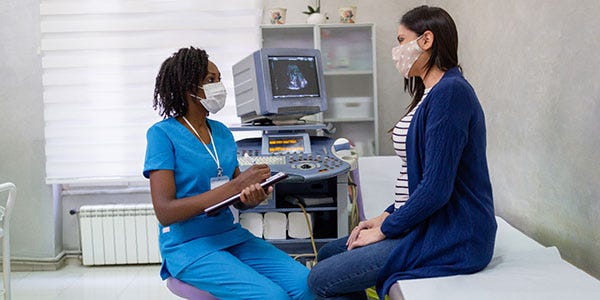The CDC is Misrepresenting Data on Pregnant Women and COVID Vaccines
The COVID/pregnancy studies aren't as strong as the CDC says
Yesterday, the CDC announced it was recommending the COVID-19 vaccines for “people who are pregnant.” CDC Director Rochelle Walensky, MD, careful to not offend pregnant males, human-lizards, or cyborgs, urged these “pregnant people” to get vaccinated, citing the benefits of the vaccine “during pregnancy outweighs any known risks.”


“People who are pregnant.” A revealing announcement, vaporizing any doubts that the CDC wasn’t politicized.
Anyway, in support of this declaration, the CDC cited “early data” from studies “did not find any safety concerns for pregnant people who were vaccinated or their babies.”
If only that were true. Let’s run through the early data and look at what these studies actually show – their flaws and all – and see how they contradict the assurances from the CDC.
Preliminary Findings of mRNA Covid-19 Vaccine Safety in Pregnant Persons, published April 21, 2021.
This self-reporting study reviewed those who “received vaccination during pregnancy or in the periconception period (30 days before the last menstrual period through 14 days after) and are 18 years of age or older.” It also reviewed VAERs data to “identify reports involving vaccination in pregnant persons.” Its participants were 79% white.
Its conclusion:
“Although not directly comparable, the proportions of adverse pregnancy and neonatal outcomes (e.g., fetal loss, preterm birth, small size for gestational age, congenital anomalies, and neonatal death) among participants with completed pregnancies from the v-safe pregnancy registry appear to be similar to the published incidences in pregnant populations studied before the Covid-19 pandemic.”
This study, however, was hardly rigorous:
“the proportion of pregnant persons who reported spontaneous abortion may not reflect true postvaccination proportions because participants might have been vaccinated after the period of greatest risk in the first trimester, and very early pregnancy losses might not be recognized.”
As to the limitations of the VAERS data – in which “miscarriage was the most common” event reported regarding pregnancy - the study states “there is probably substantial underreporting of pregnancy- and neonatal-specific adverse events.” In other words, the true numbers of miscarriages are unknown. The CDC ignores these uncertainties, hiding from the public the truth about the limitations of the studies it uses to promote vaccines for pregnant women.
The Self-Reporting Pregnancy Study, posted August 9, 2021.
This study reviewed the risk of “spontaneous abortion” (miscarriage aka SAB) in women who “received an mRNA COVID-19 vaccine preconception or prior to 20 weeks’ gestation and who did not report a pregnancy loss before 6 completed weeks’ gestation.”
It showed a slightly higher risk of miscarriage among the vaccinated (14.1%) as opposed to the “age-standardized cumulative risk” of miscarriage (12.8%).
The flaws with this study are numerous:
It did not determine causation of miscarriages. While statistical analysis can be helpful at times, it does not answer the question of why these miscarriages occurred in the first place.
It didn’t measure all post-vaccine miscarriages or stillbirths in pregnant women. It only measured those from weeks 6-20. And not just for pregnant women who received the vaccine, but women who received the vaccine prior to pregnancy.
This didn’t stop women from self-reporting their pregnancy losses. However, their stories – with 35 participants reporting a pregnancy loss – were excluded from the analysis:
Their purported reason for omitting pregnancies at 6 weeks gestation? It was “consistent with previous literature estimating spontaneous abortion in the general population.” This might be true – the omission might be consistent with previous literature – but it doesn’t tell us anything about the safety of the vaccines early in pregnancy.
Self-reporting. The study concedes that “all data were self-reported” and that the voluntary “enrollment biases are likely.” There was no testing for accuracy. The authors further admit that “confirmation of these results is needed from observational studies that include unvaccinated pregnant people.”
Racially skewed. We also note that this study is not reflective of pregnant women as a whole, with 78.3% of participants being white and only 1.4% being black, and 89% of participants being “healthcare personnel.” Its authors admit the study is “relatively homogenous with respect to racial and ethnic groups.”
The Johnson & Johnson Vaccine was “not included in this analysis.”
Conclusion
Some could say it’s malpractice to recommend pregnant women get these vaccines based on studies that rely on partial and unverified data, pregnancies/vaccines during limited weeks, and participants that are skewed by race and occupation.
Perhaps the CDC knows this, and thus frames the discussion in terms of a cost/benefit analysis. That the “benefits of vaccination outweigh any known or potential risks of COVID-19 vaccination during pregnancy.”
And what are the potential risks of vaccination for pregnant women? The CDC isn’t forthcoming.





Imagine a vaccine so safe that the government has to coerce you to take it... for a virus so deadly that you have to be tested to find out if you have it.
Just a reminder...
A genuine pandemic doesn't require 24/7 advertising to remind you that it exists.
Real pandemics don't need marketing campaigns and endless propaganda..but, psychological operations DO
The question that continually comes to mind is why they seemingly want nearly 100% vaccinated. Anyone with a modicum of sense knows that is not a good thing in the long run. Argh 😠